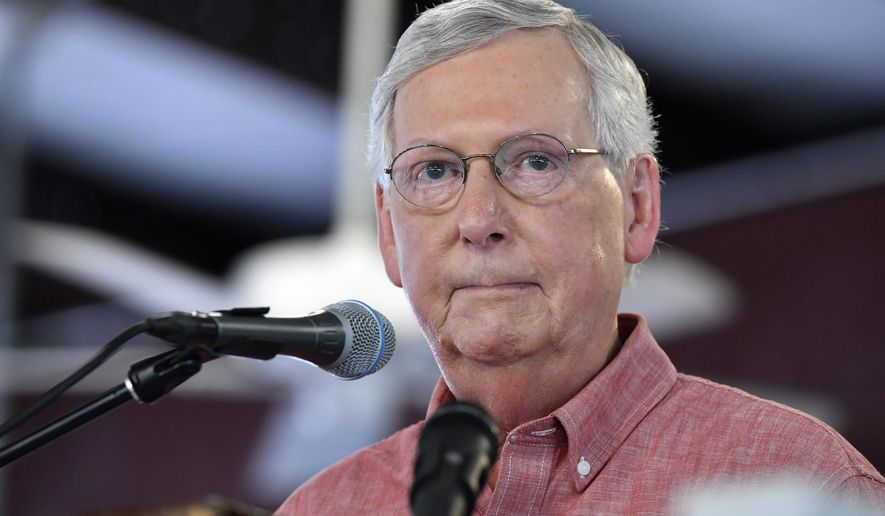Senate Majority Leader Mitch McConnell warned Democrats Thursday against doing away with the filibuster, saying they may not be happy with the unintended consequences.
He was pushing back against a vocal push by liberal activists, Democratic presidential candidates and even prominent former senators who say it’s time to do away with the defining feature of the Senate.
“I hope the saner voices among Democrats can help their compatriots see reason,” Mr. McConnell wrote in an op-ed in The New York Times.
Though the Constitution doesn’t mention the filibuster, Mr. McConnell said it flowed “directly downstream from our founding tradition” of careful deliberation, rather than efficiency of action.
“If that tradition frustrates the whims of those on the far left, it is their half-baked proposals and not the centuries-old wisdom that need retooling,” he said.
The most prominent new voice calling for an end to the filibuster is former Sen. Harry Reid, a Democrat who as minority leader was masterful in flexing it to thwart action, yet as majority leader did the most to undermine it.
Mr. Reid wrote an op-ed last week saying he now thinks the Senate’s filibuster rule should be expunged altogether, including for legislation.
“If a Democratic president wants to tackle the most important issues facing our country, then he or she must have the ability to do so — and that means curtailing Republicans’ ability to stifle the will of the American people,” the Nevada Democrat wrote. “It’s time to allow a simple majority vote instead of the 60-vote threshold now required for legislation.”
Mr. Reid’s own big moment came in 2013 when, just months after promising he wouldn’t alter it, he changed his mind and used a shortcut — the so-called “nuclear option” — to change the rules and cut the number of votes needed to surmount a filibuster from 60 down to a majority.
Mr. Reid’s anger had been piqued by GOP filibusters blocking President Obama’s nominees to the high-profile circuit court of appeals in Washington, D.C. Mr. Reid had been angered by several decisions out of that court, and was determined to install Mr. Obama’s liberal picks to try to shape future rulings more to his liking.
Mr. McConnell at the time warned him: “You’ll regret this, and you may regret this a lot sooner than you think.”
Indeed, just four years later the GOP used Mr. Reid’s precedent to install Justice Neil M. Gorsuch on the Supreme Court. If the threshold to overcome a filibuster had still been 60 votes Justice Gorsuch could have been blocked.
Mr. Reid’s 2013 changes only affected presidential nominees. The 60-vote threshold for overcoming a filibuster on bills remains in place.
Some of the Democrats who joined Mr. Reid in 2013 now say that vote was a mistake.
But the party’s left wing is eyeing the possibility Democrats win a slim majority in the Senate in the 2020 elections — but not enough to overcome a GOP-led filibuster. That would stymie their plans for government-sponsored health care, free college and a doubling of the federal minimum wage.
• Stephen Dinan can be reached at sdinan@washingtontimes.com.




Please read our comment policy before commenting.